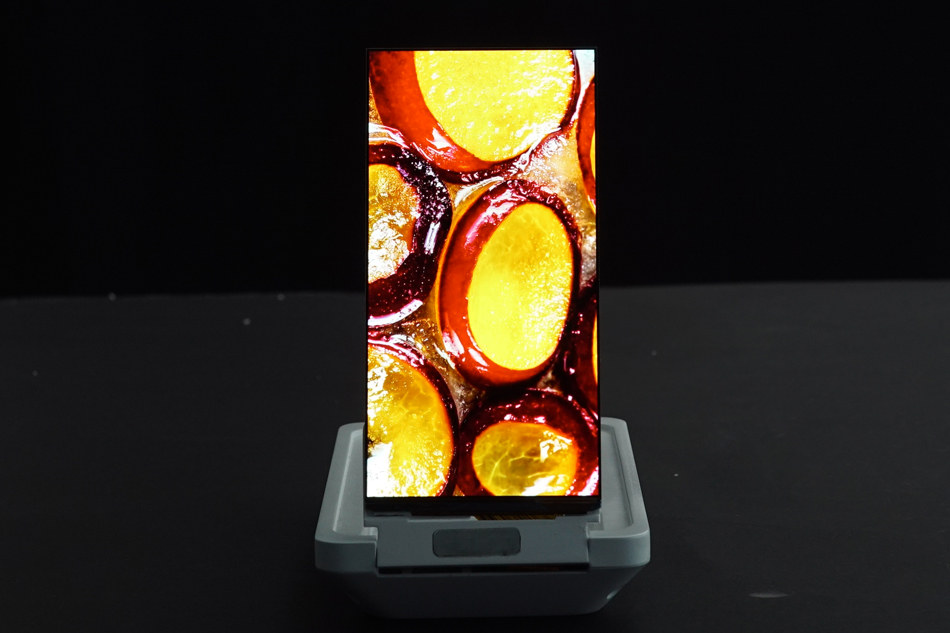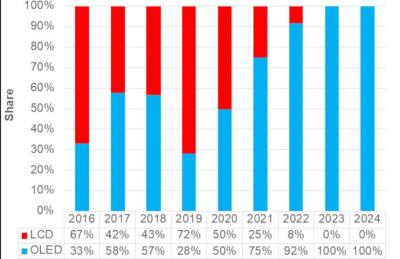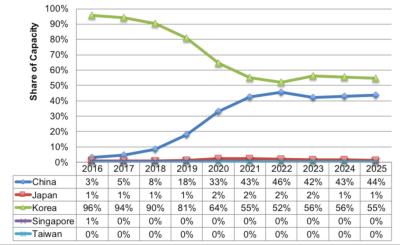 China-based Visionox was founded by Tsinghua University and other investors in 2001 with an aim to develop and manufacture OLED display and lighting panels.
China-based Visionox was founded by Tsinghua University and other investors in 2001 with an aim to develop and manufacture OLED display and lighting panels.
The company has been producing PMOLED displays for many years, and has begun AMOLED production in late 2015. In 2018 Visionox announced that it started to produce flexible AMOLED displays at its first 6-Gen OLED fab, in Hebei Province.
Visionox currently has four AMOLED production lines:
- Gen-5.5 rigid line in Kunshan (V1)
- Gen-6 flexible line in Hefei (V2)
- Gen-6 flexible line in Hebei (V3)
- Gen-6 flexible line in Guangzhou (V4)
In 2015 Visionox spun-off its OLED lighting business into a separate company called Yeolight Technology. In 2021 Visionox spun-off its PMOLED business to Qingyue as the company prepares for its IPO.
In 2018 Visionox demonstrated many PMOLED and AMOLED displays and prototypes.
Huanyang Plaza, 1 st East Road
Shangdi
Beijing
100085
China
Visionox demonstrates its latest OLED technologies at SID Displayweek 2020
China-based OLED producer Visionox demonstrated some of its latest OLED technologies at SID Displayweek 2020.
In the video above you can see the company's latest foldable, wrap-around, rollable and flexible panels, in several configurations.
Reports suggest Visionox started to ship AMOLED displays with an under-the-display camera to Huawei and Xiaomi
Last month Chinese OLED producer Visionox launched an under-the-OLED camera technology, branded as InV See - which enables a selfie camera in a full-screen OLED smartphone. According to new report from China, Visionox has already shipped InV See displays to Huawei and Xiaomi which will launch smartphones with these displays soon.
The report suggests that Visionox started to ship these displays in the second half of 2019 - and these deals were worth over 3.5 billion yuan (around $500 million USD).
Visionox launches the world's first OLED to support an under-the-display camera
Chinese OLED producer Visionox launched a new under-the-OLED camera technology, branded as InV See - which is the world's first such display. The main application for this technology is to enable a selfie camera in a full-screen OLED smartphone.
InV See utilizes a transparent section in the OLED display that allows a camera to be placed behind it. Visionox says that for this technology it developed a new pixel structure, new driver circuits and used new materials.
DSCC updates its 2019-2025 OLED market forecasts
DSCC updated their display industry forecasts, saying that as LCD prices continue to fall it revises the capacity forecast downward by 6% as Display makers are delaying and cancelling LCD investments. DSCC's OLED capacity forecast is also reduced by 4% - and is now growing at a CAGR of 19% from 2016 to 2025 (the main reason is the cancellation of Visionox V2 phase 2 and LGD's E6 Phase 3).
DSCC says that OLED TV roadmap is still not clear as Chinese makers are not ready to commit to OLED TV production. DSCC does see next-generation TV capacity coming online in the future - which could be inkjet-printed OLEDs, OVJP, MicroLEDs and other potential technologies. But the next-generation display market is certainly not clear yet and DSCC sees an extended forecast during which demand will outpace supply (especially as average TV size continues to grow).
Visionox to supply Huami with a 2.07" highly curved AMOLED display
Visionox announced that it is supplying the highly-curved 2.07" 326 PPI 430 nits AMOLED display for Huami's next-generation Amazfit X smartwatch, which will be released in Q1 2020.

Huami, which is a subsidiary of Xiaomi, is enjoying great success with its wearable devices. In 2018 it has shipped 27.5 million smartwatches - surpassing even Apple. This could be an excellent design win for Visionox.
Xiaomi shows the fold-around Mi Mix Alpha concept smartphone in its HK store
In September 2019 Xiaomi unveiled a new "concept" smartphone, the Mi Mix Alpha, which uses a foldable OLED screen wrapped around the phone. Xiaomi said this phone will be produced in small quantities (with a price tag of around $2,800) and indeed it is now displaying it in its shop in Hong Kong:
The AMOLED display, produced by Visionox, is 7.92" in size with a resolution of 2088x2250 (388 PPI).
Visionox demonstrates a beautiful rollable OLED prototype
China-based OLED producer Visionox demonstrated a beautiful rollable OLED prototype:
We don't have any information about the display, but the demo looks great - complete with a notch in the OLED (not clear if that's just part of the image displayed, though).
Xiaomi shows a concept smartphone with a flexible OLED wrapped around the edges
Update: it turns out that the display is actually wrapped around almost the entire device, see new video below:
Xiaomi is teasing a new smartphone design, with a concept model it calls the Xiaomi Mi Mix Alpha. The phone uses a flexible OLED wrapped around the edges.
This is similar to Samsung's edge OLED smartphone designs which has been in production for many years - but Xiaomi is taking it one step further with the display wrapping completely around the edges.
We now list Visionox's 6.01" 1080x2160 AMOLED display on the OLED marketplace
Today we have added a new AMOLED panel to the OLED Marketplace, a 6.01" 1080x2160 AMOLED display with on-cell touch - produced by Visionox in China.

This is a high-end AMOLED display suitable for smartphones and other applications - and it is now available at an affordable price at our supplier. Check out more information over at the OLED Marketplace, or contact us now.
DSCC sees LCD investments drying up in 2023, as the display industry shifts to OLED production
DSCC updated its display equipment spending forecast, and the company now expects LCD spending to stop completely in 2023 - as all new production lines from 2023 forward will be producing OLED displays (DSCC does not include other display technologies in this report, such as QDEL, e-paper and Micro-LEDs).

2019 will see 26% decrease in spending from 2018, with OLED spending down 64%. DSCC sees a rebound in 2020, where OLED spending will jump 132% due to new mobile flexible OLED lines in China.
Pagination
- Previous page
- Page 4
- Next page




